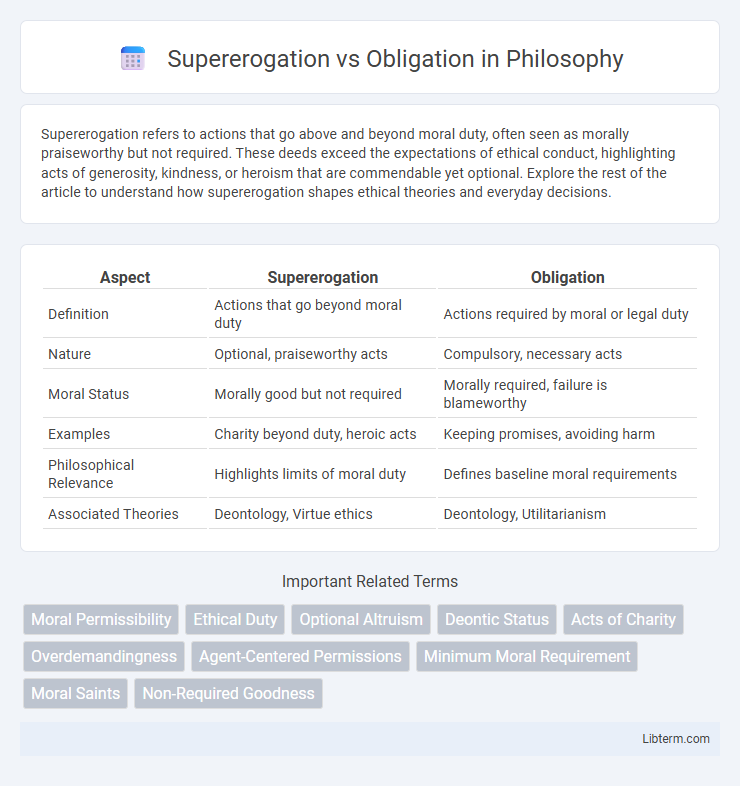Supererogation refers to actions that go above and beyond moral duty, often seen as morally praiseworthy but not required. These deeds exceed the expectations of ethical conduct, highlighting acts of generosity, kindness, or heroism that are commendable yet optional. Explore the rest of the article to understand how supererogation shapes ethical theories and everyday decisions.
Table of Comparison
| Aspect | Supererogation | Obligation |
|---|---|---|
| Definition | Actions that go beyond moral duty | Actions required by moral or legal duty |
| Nature | Optional, praiseworthy acts | Compulsory, necessary acts |
| Moral Status | Morally good but not required | Morally required, failure is blameworthy |
| Examples | Charity beyond duty, heroic acts | Keeping promises, avoiding harm |
| Philosophical Relevance | Highlights limits of moral duty | Defines baseline moral requirements |
| Associated Theories | Deontology, Virtue ethics | Deontology, Utilitarianism |
Introduction to Supererogation and Obligation
Supererogation refers to actions that go beyond moral duty, often seen as commendable but not required, whereas obligation denotes duties or actions that must be performed according to ethical or legal standards. In philosophy and ethics, supererogatory acts are voluntary and praise-worthy, such as acts of charity that exceed basic moral requirements. Obligations, in contrast, impose binding duties essential for societal functioning and moral coherence.
Defining Supererogatory Acts
Supererogatory acts exceed moral obligations by performing commendable actions that are not required or expected, such as donating a kidney to a stranger or volunteering extra time without compensation. These acts contribute positively to ethical behavior but do not generate moral blame if omitted, distinguishing them from obligatory duties that demand compliance. Understanding supererogation clarifies moral theory by highlighting actions praised for generosity beyond essential responsibilities.
Understanding Moral Obligation
Moral obligation refers to actions that individuals are ethically required to perform, often grounded in social norms, laws, or moral principles, whereas supererogation involves actions that go beyond these basic duties and are morally commendable but not mandatory. Understanding moral obligation helps distinguish between what one must do to fulfill ethical responsibilities versus what one may choose to do as a moral ideal, highlighting the boundaries of duty and virtue. This distinction is crucial in ethical theory, legal frameworks, and everyday moral decision-making, where clarity about obligations influences judgments of right and wrong.
Key Differences Between Supererogation and Obligation
Supererogation involves actions that go beyond moral duty, considered commendable but not required, whereas obligation mandates actions that individuals are ethically or legally bound to perform. Obligations carry a sense of duty with consequences for non-compliance, while supererogatory acts are voluntary and praised without penalty if omitted. Key differences include the compulsory nature of obligations contrasted with the optional, exemplary nature of supererogation.
Philosophical Foundations of Supererogation
Supererogation refers to morally praiseworthy actions that go beyond duty without being required, contrasting with obligations which are mandatory ethical responsibilities. Philosophical foundations of supererogation explore concepts such as moral permissibility, optionality, and the limits of ethical duty, emphasizing acts of kindness or heroism that exceed obligatory norms. The debate centers on whether supererogatory acts hold intrinsic value or merely reflect personal virtue beyond formal moral requirements.
Examples of Supererogatory Actions vs Obligatory Duties
Donating a significant portion of income to charity exemplifies a supererogatory action, going beyond moral duty, whereas paying taxes constitutes an obligatory duty required by law. Volunteering at a community shelter voluntarily is supererogatory, contrasting with obligatory duties such as following safety regulations at work. Supererogation involves actions praised for moral excellence without being mandatory, while obligations are compulsory acts essential for ethical or legal compliance.
The Role of Supererogation in Ethical Theories
Supererogation in ethical theories represents actions that go beyond moral obligations, highlighting acts of moral excellence without being required. It challenges rigid duty-based frameworks by introducing voluntary, praiseworthy behaviors that enhance moral evaluation and ethical discourse. This concept plays a crucial role in expanding normative ethics, emphasizing the significance of moral superfluity in understanding human conduct.
Criticisms and Challenges to Supererogation
Supererogation faces criticism for its ambiguous boundaries between morally praiseworthy acts and obligatory duties, leading to practical challenges in ethical decision-making. Critics argue that the lack of clear criteria for what constitutes supererogatory behavior complicates its application in moral philosophy and real-world scenarios. Furthermore, some challenge the concept by suggesting that labeling acts as supererogatory might undermine the motivational force of moral obligations.
Practical Implications in Everyday Life
Supererogation involves actions that go beyond moral duty, such as volunteering extra hours or donating beyond personal means, while obligations represent mandatory duties like paying taxes or following laws. In everyday life, understanding this distinction helps individuals prioritize essential responsibilities while recognizing opportunities for moral excellence without guilt. Balancing obligations and supererogatory acts fosters ethical behavior and promotes social cohesion within communities.
Conclusion: The Importance of Distinguishing Supererogation from Obligation
Distinguishing supererogation from obligation is crucial for ethical clarity, as obligations define mandatory actions, while supererogatory acts represent morally praiseworthy but optional behavior. This differentiation helps in setting realistic expectations and prevents the undue moral pressure associated with conflating voluntary generosity with duty. Recognizing this distinction supports a more nuanced understanding of moral responsibility, enhancing both philosophical discourse and practical decision-making.
Supererogation Infographic

 libterm.com
libterm.com